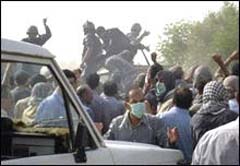According to multiple news sources and Iranian exiles with contacts in the People’s Mujahedin of Iran (PMOI) camp in Iraq known as Camp Ashraf, the camp was attacked by Iraqi forces on July 28 and 28, 2009.
At least eleven camp residents were killed. Also, according to these same sources, the attack was witnessed by US forces who sat by and did nothing, despite pleas from wounded Iranians. It is believed that the reason for the attack was a promise made by the al-Maliki government in Baghdad to Tehran that they would close the camp down. Iraqi officials have denied this, saying simply that they wished to establish a police post there. Meanwhile, the camp residents have asked for US protection.
The PMOI and the National Council of Resistance in Iran (NCRI) are the modern day representatives of an Iranian resistance group that goes back to the days of the Shah. Their beginnings are in the student movement that rose up against the Shah and US imperialism, ultimately throwing the Shah out of the country. The group itself has undergone several ideological changes since its inception and is currently best typified as a secular organization opposed to the social conservatism of the theocratic government in Tehran. To go beyond this general description requires considerably more space than is available here.
Unfortunately for the PMOI, it was categorized as a terrorist organization by the Bill Clinton administration. It continues to carry this designation in the US, although the designation was removed by the European Union earlier in 2009. On top of this label, which has certainly isolated the NCRI and PMOI from potential support among certain elements of the US power structure, the PMOI and NCRI have found their friendliest allies in the US amongst the pro-Zionist wing of the neoconservative movement. Although one can conceive of this support as simply a cynical move by the neocons to gain Iranian intelligence available to the NCRI in their never-ending drumbeat towards an attack on Iran, the other side of the coin is that the NCRI and PMOI have curried this favor. This fact alone has made it next to impossible for the members of these groups to get any positive press or support from the US left and antiwar movement. Indeed, this coziness was enough to convince this writer to view these organizations with considerable caution, despite professing guarded support for them in the past. After all, in the US, it does matter who one shares their political bed with.
This attack and its aftermath is not about the PMOI’s all too apparent coziness with elements of the neoconservative establishment in the United States. It is about a human rights violation by Washington’s client government in Iraq. This is also not the recent elections in Iran and whether or not they were fair. It is about a group of dissidents who appear to be somewhat isolated from their natural constituency while also being surrounded by well-armed US and Iraqi military with instructions to keep them penned where they are.
It is wrong that the members of the PMOI were attacked by forces of the Maliki government in Baghdad on July 28 and 29, 2009 while US forces looked on. It is the right thing to expose this action and to ask that it not be repeated. The attack exists as a human rights violation in a country that is a vast ocean of human rights violations, many of them the result of the US invasion. It should be condemned. Yet, for some reason, the PMOI is asking one of the greatest human rights violators in Iraq and elsewhere around the world–the US government–to protect them.
Ron Jacobs is the author of The Way The Wind Blew: A History of the Weather Underground. His most recent novel Short Order Frame Up is published by Mainstay Press. He can be reached at: rjacobs3625@charter.net. Read other articles by Ron, or visit Ron’s website.
Andres Kargar replies to the article:
While I agree that the Iraqi attack on Mujahedin was a violation of the human rights of the residents of the camp, I should also state a few other facts that are missing from this article.
Firstly, the decision of the leadership of the Mujahedin to remain in Iraq was made in order to continue their activities to destabilize the Islamic Republic regime in Iran.
Today, the political orientation of the Mujahedin Organization is no longer what it used to be when they employed a mix of religion and Marxism to struggle against the dictatorial regime of the Shah. They have remained in Iraq to serve the interests of Israel and the United States. Prior to that, they were serving as the propaganda tool of Iraq’s Saddam Hussein against Iran. That was the mistake that eroded any degree of support they might have enjoyed among Iranians.
Many of the residents of camp Ashraf are there against their will. There are many teams of husbands and wives in that camp who have been kept totally separated from one another, since men and women there live in totally separate quarters.
Eager to disband the threat of Mujahedin, the Iranian regime has offered asylum to those members who desert their posts and turn themselves in. Some who have managed to get away have sought and been granted asylum in Iran.
And finally, many (but perhaps not the majority) of those in Camp Ashraf are also citizens of the United States or one of the European countries. If they wanted to and were allowed, they could be repatriated to those countries.
by Ron Jacobs

